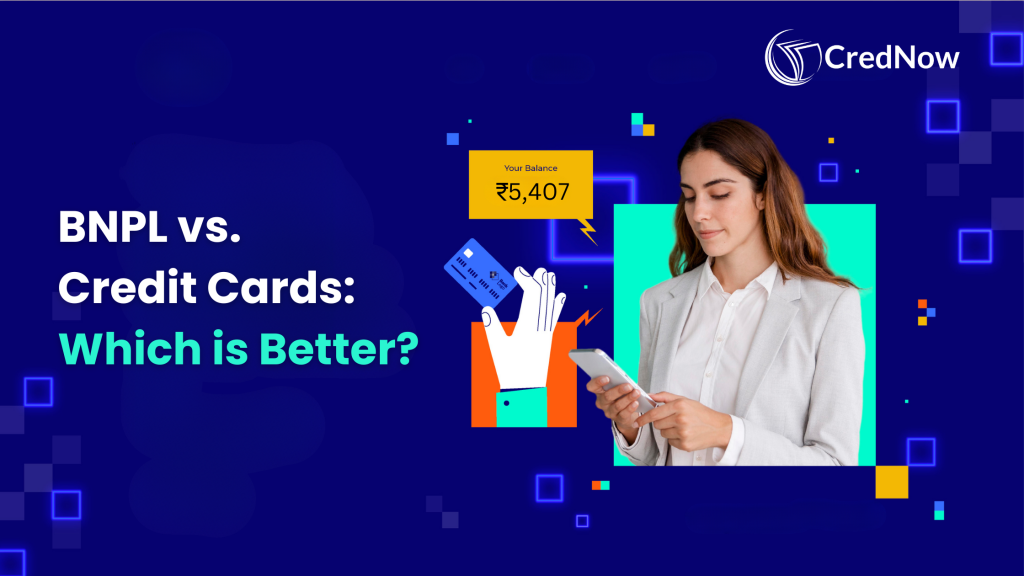In India, the digital financial services landscape is rapidly evolving with the rise of digital payments. Buy Now, Pay Later (BNPL) services have gained significant traction, particularly among young consumers, as an easy financing alternative to traditional credit cards. The debate of ‘Buy Now Pay Later (BNPL) vs credit card’ has become increasingly relevant as consumers weigh their financing options. When deciding between Buy Now, Pay Later (BNPL) services and credit cards, it is important to consider the differences in how they operate, their benefits, and their potential drawbacks / limitations. Both options allow you to spread out your payments over time, but they differ significantly in terms of interest rates, fees, credit impact, and consumer protection.
Buy Now Pay Later (BNPL) vs credit card: A comprehensive comparison
1 Accessibility and Ease of Use
BNPL services are often easier to access for consumers who might not qualify for a credit card. They typically require only a soft credit check, if any, making them more accessible to those with limited or poor credit histories. They are also integrated directly at the point of sale, making them a convenient option for immediate purchases.
Several BNPL providers have gained popularity in India:
- Amazon Pay Later integrates seamlessly with Amazon India, enabling deferred payments with minimal hassle for regular shoppers on the platform.
- Flipkart Pay Later offers convenient one-click checkout with instant credit up to ₹1 lakh, allowing flexible payment options including EMIs or next month payment, making it an attractive choice for savvy online shoppers.
- LazyPay provides instant credit at checkout, allowing users to pay within 15 days, which adds convenience for those who need short-term financial flexibility.
- Simpl focuses on facilitating quick and easy transactions by consolidating all purchases into a single bill at the end of the month.
Credit cards, however, offer broader acceptance across a wide range of merchants and provide a revolving line of credit that can be used repeatedly. While the application process for a credit card involves a hard credit check and requires more stringent eligibility criteria, it also offers more flexibility in terms of where and how you can use it.
Major credit card issuers in India include HDFC Bank, SBI Card, ICICI Bank and Axis Bank. They offer a range of benefits, including reward points, cashback, and extensive credit limits, and continue to dominate the credit card market by providing customers with various financial products tailored to meet diverse needs.
2 Interest Rates and Fees
BNPL services typically offer interest-free installment plans, particularly for short-term payments. This can make BNPL an attractive option for consumers looking to avoid interest altogether, as long as they pay on time. However, some BNPL providers charge interest for longer repayment periods, and late fees can apply if payments are missed, adding to the cost.
Credit cards, on the other hand, often come with variable interest rates that can be quite high if you carry a balance beyond the due date. While credit cards provide a grace period where you can pay off your balance without incurring interest, any unpaid balance after this period will accrue interest. Additionally, credit cards may have other fees, such as annual fees, late payment fees, and fees for cash advances.
3 Impact on Credit Score
Credit cards play a significant role in building and impacting your credit score. Responsible use of a credit card, such as making timely payments and keeping your balance low relative to your credit limit, can help improve your credit score. Conversely, missed payments or high credit utilization can negatively affect your credit.
BNPL services usually do not report to credit bureaus unless the account is delinquent. This means they generally have no positive impact on your credit score, but could have a negative impact depending on your situation. If you’re looking to build or improve your credit, a credit card might be a better tool. However, some newer BNPL services are starting to report payment history, which could affect your credit.
Also Read: How to improve your credit score before applying for a loan
4 Consumer Protection
Credit cards offer robust consumer protection, including fraud protection and chargeback rights, which allow you to dispute charges for unauthorized transactions or if there is an issue with a purchase. These protections can provide peace of mind, especially for large or online purchases.
BNPL services generally offer less comprehensive consumer protections, and the level of protection can vary widely between providers. This means that if something goes wrong with your purchase, you may have fewer options for recourse compared to using a credit card.
Market trends and demographics
A significant portion of BNPL users in India are aged between 18-35, reflecting a younger demographic that may not have access to traditional credit cards. This trend aligns with the global growth of BNPL services. The Buy Now Pay Later (BNPL) payment industry in India has demonstrated robust growth over recent quarters, propelled by increasing e-commerce penetration. The sector’s medium to long-term growth outlook remains promising, with BNPL payment adoption projected to expand at a CAGR of 12.2% from 2023 to 2028.
Conclusion: Which is the better choice?
The choice between BNPL and credit cards ultimately depends on your financial situation, needs and spending habits. If you’re looking for a short-term, interest-free way to finance a purchase and can commit to on-time payments, BNPL might be the better choice. However, if you want to build your credit score, need consumer protection, and value the flexibility of revolving credit, a credit card could be more beneficial.
When weighing the Buy Now Pay Later (BNPL) vs credit card options, it’s crucial to assess your own needs, payment habits, and financial goals. Understanding the nuances of each can help you make an informed decision that aligns with your financial well-being. Remember, the right choice in the BNPL vs credit card debate will vary from person to person, so consider your individual circumstances carefully.
FAQs:
1. What is the difference between Buy Now, Pay Later (BNPL) and Credit cards?
BNPL and credit cards both allow consumers to make purchases and pay over time, but they differ in their payment structure and approval process. BNPL typically offers short-term installment plans with no interest if paid on time, often requiring no credit check. In contrast, credit cards provide a revolving credit line with potential rewards but can charge high interest if the balance isn’t paid in full each month.
2. Which is better for managing large purchases: BNPL or Credit cards?
BNPL can be better for large, one-time purchases if you prefer fixed installment payments without interest. Credit cards, however, offer more flexibility with payments and often come with rewards or cash back, which can be beneficial for recurring or varied purchases. Your financial situation and discipline in managing payments will determine the best option.
3. Does using BNPL impact your credit score like credit cards do?
Generally, BNPL services do not require a hard credit check and will not affect your credit score, unlike credit cards, which involve a credit inquiry during application and report your usage to credit bureaus. However, missing BNPL payments could lead to fees and might impact your ability to use these services in the future.
4. Can I use BNPL services everywhere like I can with a credit card?
BNPL services are not as universally accepted as credit cards. They are typically available only with participating retailers. Credit cards, however, are widely accepted by most merchants both online and in-store, making them more versatile for everyday spending.
5. What are the long-term financial implications of using BNPL vs credit cards?
Long-term, using BNPL could limit your ability to build credit, as these services don’t typically report to credit bureaus. Credit cards, if used responsibly, can help build your credit history, which is essential for obtaining loans and favorable interest rates in the future. However, carrying a balance on a credit card can lead to high-interest debt if not managed properly.



